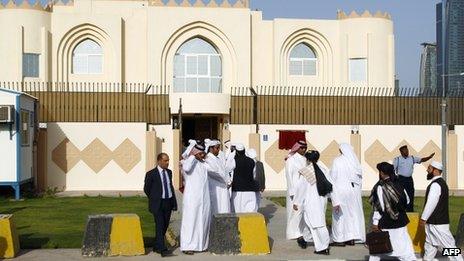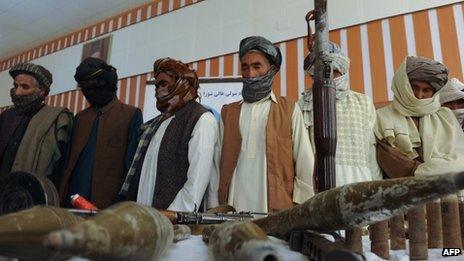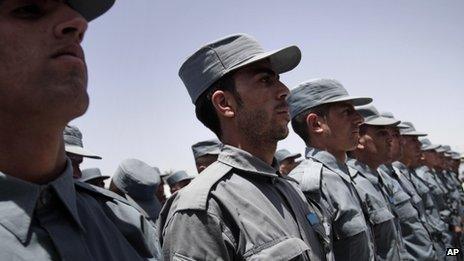Can Taliban talks be revived after the 'Doha debacle'?
- Published

Much depends on possible talks at the Taliban's Doha office if peace can be brought to Afghanistan
For the third time in two years the US, the Afghan government and Taliban mediators are waiting to resume their dialogue on trying to bring the war in Afghanistan to a peaceful end. Writer Ahmed Rashid assesses the chances of success.
Third time lucky appears to be the motto as all sides are now keen to get back to the negotiating table after the debacle in Doha last week, but the Taliban need a face-saving exercise that will allow their mediators to resume talks while preventing greater dissension in their ranks.
In December 2011 it was Afghan President Hamid Karzai who refused to agree to the terms for opening a Taliban office in Doha after the US and Taliban had met secretly four times to thrash out the details.
At a major conference in Bonn attended by 90 foreign ministers, the Taliban were on the verge of accepting US conditions that were almost identical to the present-day conditions. But it ended in failure after Mr Karzai objected to terms already agreed upon by the interlocutors.
Face-saving mechanisms
Earlier this month it was the Afghan government and the Americans who erupted in fury after the Taliban, contrary to earlier agreements, opened their office in Doha but insisted upon raising their flag and calling the office by its former name for the country - the Islamic Emirate for Afghanistan.

The Taliban show no sign of their campaign weakening despite government-arranged surrender ceremonies
According to diplomats it is now apparent that it was the Qataris who were initially at fault, ignoring a negotiated document that had been signed by the US and the Taliban which stipulated how the office should be opened and run.
The Taliban had conveniently ignored the document also, but it was the job of the Qataris to remind them of it and for the Western players involved - the US, Britain and Norway - to make sure the fine print was being adhered to. Qatar has a tiny diplomatic corps which is less experienced in the ways of the Afghans or peace making.
Intense debate
In the week following the breakdown all sides are waiting to hear from the Taliban as to whether they will resume the talks under the new conditions. Western powers have offered them as many decent compromises and face-saving mechanisms as they may want - as long as they are reasonable and the Afghan government accepts them.
One possible way out of the disputes over the flag in Doha - and how Afghanistan should be named - could be resolved relatively simply if the Taliban agree not to display them so prominently.
Meanwhile there is an intense debate going on within Taliban ranks over their approach to peace talks, according to insiders.
The hardline commanders in the field - who were initially against the talks - have got a second lease of life arguing that the Americans are purely out to bluff and lie to them.
Clearly the Taliban leaders cannot be seen by their rank and file to have succumbed to Western pressure which is why a face-saving formula has to be found.
However the peace lobby within the Taliban - those advocating talks and reconciliation to avoid a future civil war - have also been active pointing out that this would be the last chance to start talks with the Americans.
Contrary to media speculation it appears that the Haqqani network is in favour of the talks and is urging its followers to support them, although they are not calling off the fight just yet.
Pakistan and its Interservices Intelligence (ISI) is trying to play a role in persuading the Taliban to return to the table.
Increasingly hostile
Having long been accused of meddling in Afghan affairs for its own ends, Islamabad is desperately keen to make sure that the talks do not collapse, because successful talks could not only lead to an end to the destabilising war in Afghanistan, but also to a reduction of Pakistani Taliban militancy.

From the end of next year Afghan forces will have to operate without Nato's help
The ISI did play a positive role in initially getting the Taliban to return to Doha after a break of 16 months and it is doing so again, but it is unclear exactly how much influence it carries among a Taliban leadership which is becoming increasingly hostile to Pakistan's influence.
What makes these talks increasingly important is the fact that 18 June was also the day when US and Nato forces handed over the entire security of the country to the Afghan National Army.
After foreign forces leave at the end of next year, the Afghans will have to fight on their own - without the air power, medical back-up and other privileges provided by the US and Nato - knowing that Western soldiers will no longer be at their side in battle.
This is precisely the moment when the Taliban have also stepped up their offensive on the ground with a mixture of spectacular suicide attacks in Kabul, the heavy use of improvised explosive devices on the roads, ambushes of army convoys and insider killings of Afghan security forces by closet Taliban.
The militants have made it clear that they will fight and talk at the same time until there is agreement on a ceasefire.
The first step the Taliban want the Americans to take is to free their five prisoners in Guantanamo Bay, which because of various legal problems and the reluctance of the US Congress, could still take months to happen.
The Americans on the other hand want to know how far the Taliban have distanced themselves from al-Qaeda and if they can prove it. Issues such as a ceasefire are not uppermost in the American mindset at present.
Perhaps the most long lasting change in the US position is that for the first time President Barack Obama is engaged and playing a role in trying to persuade all the players to co-operate. He telephoned President Karzai and spoke for 90 minutes after the Doha debacle and has been in regular contact since then,
US Secretary of State John Kerry has been in touch with Pakistani military and civilian leaders, while the US Special Envoy James Dobbins did a swing-through of Afghanistan, Pakistan and India during the hiatus in Doha, reassuring allies that the US was still engaged and waiting for the Taliban.
Although President Obama was never actively engaged with the two previous US special envoys, the White House did give its support to what they were doing to start the talks process.
However now that the president is personally engaged, it means that he is putting his reputation on the line and the US is now more committed to these talks than before.
With the president involved the US cannot just walk away from these talks, it has to do everything to ensure that they happen.
So we can maybe expect the Taliban to return to the table sooner rather than later with possibly some changes in the format of the Taliban office that would be acceptable to all players.
What happens next is unpredictable but with only a year before a total US pull-out it is self-evident that a ceasefire on the ground and political negotiations are quickly needed if the transition is to be successful.